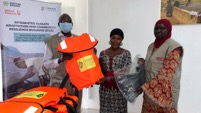
Officials said the equipment, which include 370 life jackets, 913 hand gloves, 1,049 goggles, 840 shocks and 18 canoes, is worth one million dalasis.
The equipment were distributed to 18 communities including Kartong, Berending, Bulock, Sutisinjang, Karani, Gissay, Sandeng, Jataba, Tankular, Kemoto, Misira, Bumboto, Meme, Mbakam, Ginnack Ngi, Ginack Kajatta, Sami Tenda, and Tambana.
The support, officials went on, is aimed at ensuring the safety and security of the women oyster collectors and other users.
The presentation also formed part of the United Purpose’s five-year project dubbed ‘Integrated Climate Adaptation and Community Resilience Building (ICCR)’.
The ICCR project is being implemented by Self Help Africa (SHA) The Gambia with funding from the Irish Government.
The project targets 12,000 participants, including 9,250 females and 2,750 males with an estimated budget of £1,498,645.
The ICCR project is aimed at improving the adaptive capacity of vulnerable populations in coastal and river bank areas through livelihood diversification and integrated management approaches.
The ICCR project partners include Trust Agency for Rural Development, Njawara Agriculture Training Centre, Freedom From Hunger Campaign, Women Initiative The Gambia, and Kartong Association for Responsible Tourism.
Speaking at the presentation ceremony, Ngansa Touray, ICCR project manager, said: “The ICCR project aims at advancing and improving the adaptive capacity of vulnerable populations in coastal and river bank areas in the country.”
The project’s three main outcomes, she stated, are equitable and inclusive stewardship of marine protected areas, with the objective of supporting livelihoods and healthy ecosystems; equitable and inclusive food system to support availability and consumption of safe and nutritious food, and equitable and inclusive enterprises with the desire to contribute to adaptive green economies.
These outcomes, Touray added, will be achieved through ‘enhancing the conservation of coastal resources through mangrove restoration which is essential for communities, enhancing food security and incomes of vulnerable populations through sustainable oyster harvesting and processing, and for waste management and vegetable production.
“The outcome areas will also be achieved through supporting coastal communities to developing community adaptation plans, thus building their understanding of climate change and their capacity to plan and respond to it,” she said.
She maintained that the project’s main activities are anchored on food system strengthening and landscape management.
“These include natural resources conservation and management; waste enterprise support for environmental conservation and livelihood enhancement; introduction of oyster collection best practices- learning from Joal, in Senegal.”
She further said: “These will also include the establishment of rack culture best practices in oyster farming in order to produce healthy and nutritious oysters, while addressing wash-related issues and promoting hygiene and environmental conservation and enhancing nutrition.”
She urged the beneficiary communities to take good care of the donated items with a view to ensuring their sustainability.
Modou Lamin Manneh, who was speaking on behalf of the partner organisations, underscored the importance of empowering oyster farming in The Gambia.
Manneh suggested the need to introduce horticultural farming to oyster farmers, especially during their off-season; so they could also be engaged in vegetable farming.
Wontonding Fadera, a beneficiary of the project's latest gesture, thanked United Purpose for their efforts in empowering women and providing them with preventive measures in their quest for economic activities.
“The empowerment of women in the horticultural farming is needed, as it will strengthen farming towards sustainable development,” she pointed out.
For his part, Mbemba Jabbie, country director of United Purpose, said: “The presentation marked a significant day in the history of the organisation in providing protective equipment to oyster producers. These gestures will go a long way in not only boosting them in their desire to increasing their production, but will also help in preventing them from injuries among other physical harm or damage.”
The protection of lives and livelihoods, he continued, is of paramount importance to his organisation, adding: “We are committed to ensuring that we strengthen our collaboration with our partners. In fact, over the years, we have been contributing immensely towards the growth and development of our partners’ organisations. We have implemented many projects in the country and we will continue towards that path.”
He further said: “It is good to produce oysters, but its end production is essential. Therefore, we need to strive towards the supply of oyster in our hotels and also see possibilities of exporting it to European countries.”
Meanwhile, some beneficiary communities within the Foni urged for more support, especially in fencing their gardens.





